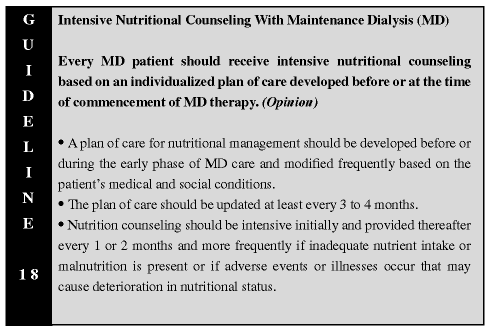
4. Nutritional Counseling and Follow-Up

The high incidence of PEM and the strong association between measures of malnutrition and mortality rate in individuals undergoing MD suggests the need for careful nutritional monitoring and treatment of these individuals. Whether or not such intervention prevents or improves nutritional status has not been examined, but evidence clearly suggests that inadequate nutritional intake is an important contributor for PEM in these patients.159 Moreover, evidence from large multicenter trials utilizing nutrition intervention indicates that frequent nutrition counseling results in compliance with the intervention and improved outcomes.160-163 Although similar studies have not been performed in MD patients, it is reasonable to assume that similar results would occur with the ESRD patient population.
The dietitian-performed nutrition assessment includes the development of a plan of care that incorporates all aspects of the nutrition evaluation (nutritional status assessment, nutrition history, patient preferences, and the nutritional prescription). These are incorporated into an active plan that is then implemented by the medical team. This care plan should be updated on a quarterly basis. The nutrition care plan should be incorporated into a continuous quality improvement plan. This plan of care should be implemented and reviewed in a multidisciplinary fashion that includes the patient and/or caregiver (often the patient's spouse) and the physician, nurse, social worker, and dietitian.
Conditions in which the patient's nutritional status may deteriorate rapidly may dictate more frequent evaluation of the nutrition care plan. Examples of such conditions are unexplained reductions in energy or protein intake, depression, deterioration in other measures of protein-energy status, pregnancy, acute inflammatory or catabolic illnesses particularly in the elderly, hospitalization, diabetes mellitus, large or prolonged doses of glucocorticoid or other catabolic medications, and post-renal transplant allograft loss. Under these circumstances, monthly or weekly updates to the nutrition plan of care and more intensive nutrition counseling may be necessary.